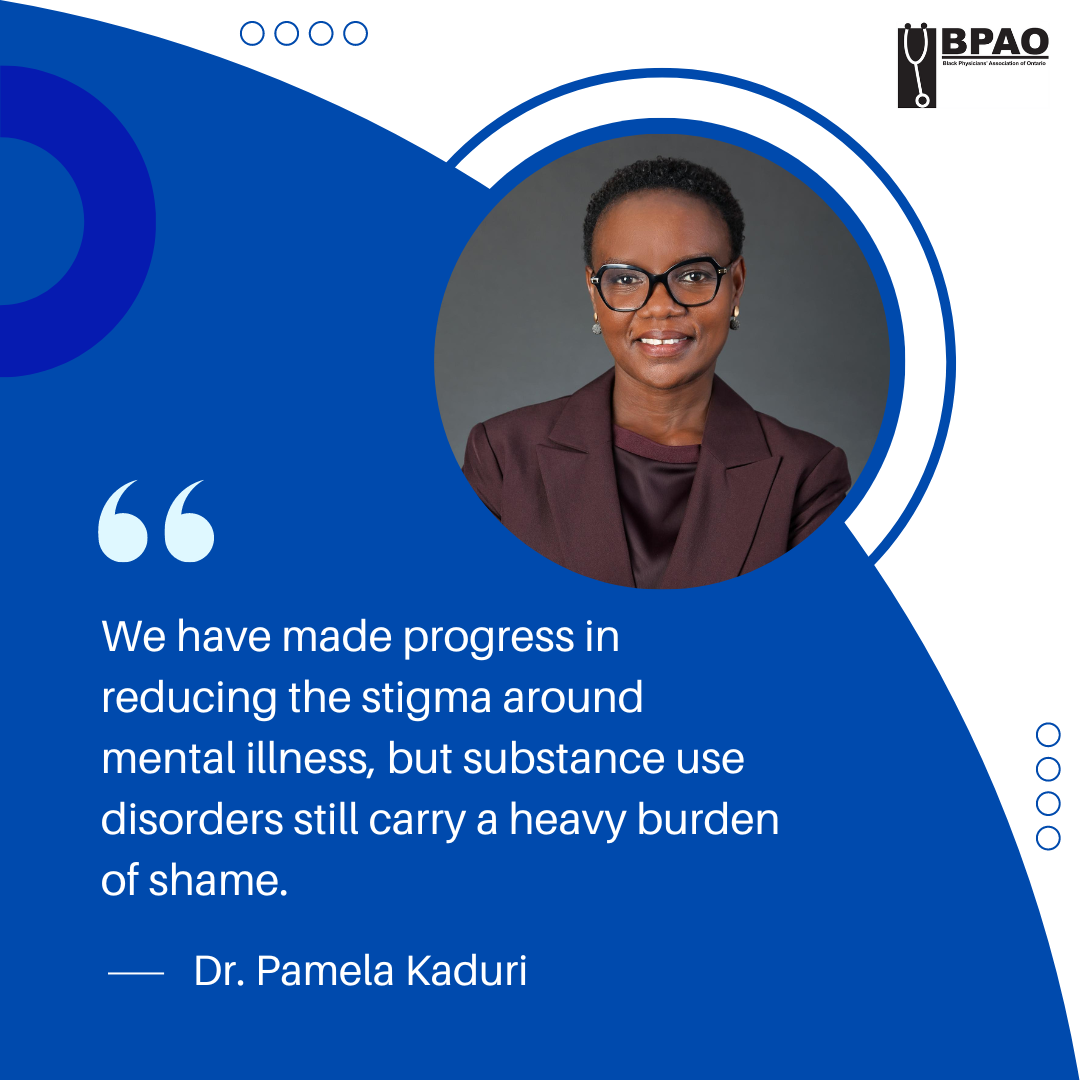A Journey of Curiosity: Dr. Pamela Kaduri’s Commitment to Mental Health and Addiction
This September, we are thrilled to feature Dr. Pamela Kaduri, an addiction psychiatrist and assistant professor at the University of Toronto. Driven by a deep curiosity and passion for mental health, Dr. Kaduri has made remarkable strides both in Canada and abroad. From pioneering Tanzania’s first methadone program to advocating for culturally sensitive mental health care for marginalized communities, her work is truly transformative. Dr. Kaduri’s commitment to addressing the complex challenges faced by vulnerable populations is an inspiration to us all.
They say that the trajectory of a life can often be traced back to moments of curiosity. For Dr. Pamela Kaduri, an addiction psychiatrist and assistant professor at the University of Toronto, it all began with a frog. Growing up in Tanzania, a young Dr. Kaduri was tasked with catching a frog for her biology class. Little did she know that her determination to find that frog would ignite a lifelong fascination with the human mind and body. Among her classmates, she quickly earned the nickname “curious cat”, an early indication of the inquisitive spirit that would go on to shape her career. Today, that same curiosity fuels her work, as she balances the complexities of mental health and addiction with a deep commitment to care provision, conducting research, impacting policy, teaching and mentoring others. At the University of Toronto, she co-leads a mentorship group that uplifts women and underrepresented genders while promoting diversity in academia.
Yet, medicine wasn’t always her only dream. Dr. Kaduri recalls her final year of high school as a period of contemplation, where she found herself drawn to two different futures. “I saw myself as a physician,” she explains, “but I also enjoyed acting, drama and theater arts were a big part of my life.” Inspired by her passion for the arts, she applied to universities in the UK to study acting, envisioning a career on stage. Her parents, however, encouraged her to focus on medicine, promising she could pursue acting afterward if she still desired. This nudge, coupled with her growing exposure to clinical environments at a young age, led her to medical school.
Dr. Kaduri’s journey has taken her across continents and between countries, from Tanzania to Canada, enriching her understanding of mental health in diverse cultural contexts. She has found that blending Western and traditional models of treatment often provides the most effective care for her patients. “Whether it’s the expatriate community in Tanzania or minority populations in Canada, I’ve seen how cultural differences impact mental health outcomes,” she explains. She understands that navigating life as a minority in a new environment can increase vulnerabilities to psychological distress, mental health and substance use issues.
In 2011, Dr. Kaduri played a pioneering role in establishing Tanzania’s first methadone program in a public health facility in Sub-Saharan Africa. Her work in addiction treatment highlights the profound overlap between addiction, suicide risk, and other vulnerabilities in immigrant and racialized populations. She emphasizes the need for culturally sensitive, trauma-informed care, noting that accessibility to quality services and affordability are key to prevention. “Language barriers are a significant challenge,” she says, “and while some resources are available in other languages, much more needs to be done to ensure that these services are universally accessible.”
Understanding the role of culture in shaping mental health is central to Dr. Kaduri’s approach. She explains that culture offers a sense of identity and belonging, which, when disrupted, whether through immigration or loss of community, can lead to mental distress and heightened suicide risk. “Cultural differences often result in isolation, discrimination, and stigma, which can worsen mental health issues,” she says. To combat this, she advocates for community-driven initiatives where people with lived experiences, survivors, community elders, religious leaders, and healthcare professionals work together to address these challenges.
Despite the many triumphs in her career, Dr. Kaduri is keenly aware of the ongoing battle against stigma, especially around addiction. “We’ve made progress in reducing the stigma around mental illness, but substance use disorders still carry a heavy burden of shame,” she notes. She finds that psychoeducation on the illness and its management, compassionate care and trust-building are vital in breaking down these barriers. Through metaphors that compare mental illness to other chronic conditions like diabetes or hypertension, she helps patients understand that, with proper care and adequate support, they can manage their conditions and lead fulfilling lives.
For Dr. Kaduri, maintaining her own mental well-being is just as important as her professional commitments. Outside of work, she nurtures her mental health by spending time with family and friends, connecting with nature, and engaging in self-care activities like hiking and adventures.
As she looks to the future, Dr. Kaduri has a message of encouragement to young professionals, particularly those from underrepresented backgrounds. “Anything is possible,” she says with conviction. She urges them to work hard, seek mentorship, being authentic, and prioritize their own well-being while pursuing their passions. Resilience, she believes, is the key, not only in the face of adversity but in finding joy along the journey.


